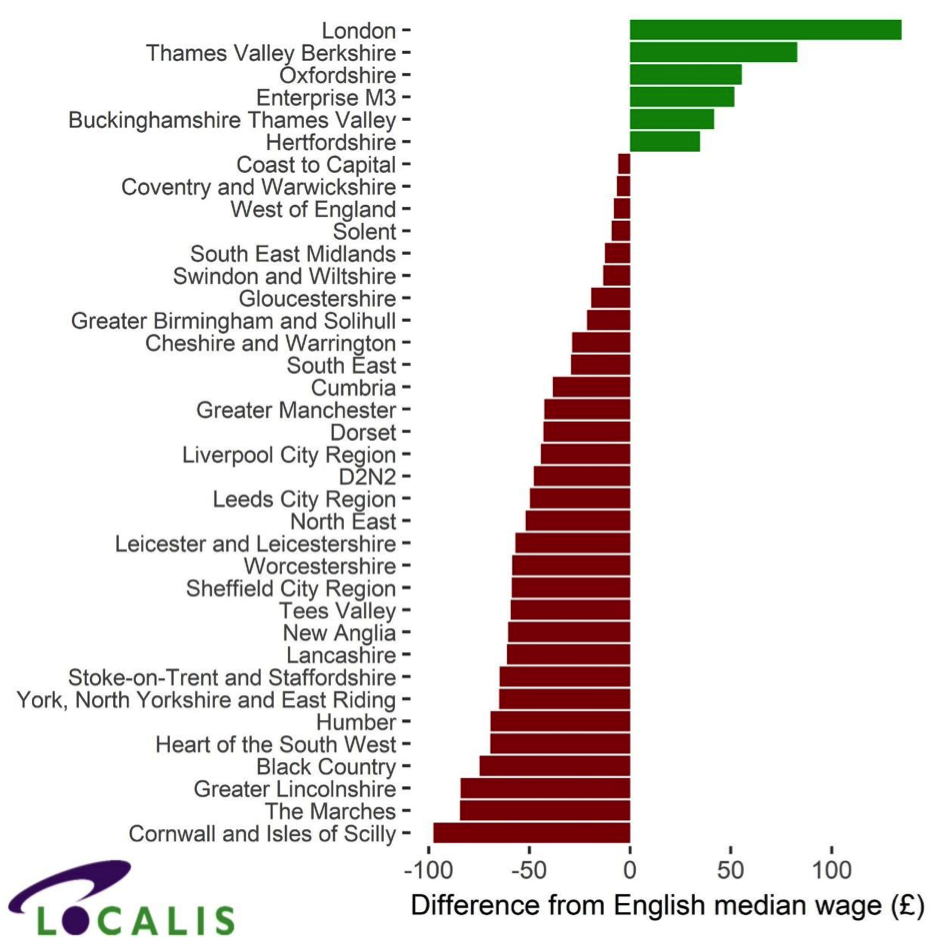If the Brexit news and speculation industry were factored into our nation’s lagging productivity performance, that would be one less headache for public policy to solve.
Our latest report – Ethical Commercialism – looks to highlight a problem faced by local authorities, as both employers and as guardians of place, that rule changes after Brexit may actually make it easier to solve.
The UK has a wage problem. The graph below, taken from our work on local industrial strategies, shows the difference from the national median wage (£574 gross a week) for each local enterprise partnership area in England.
From the North East to Cornwall, people across the country are having trouble extracting a fair day’s pay from a fair day’s work.

So what constitutes fair pay? The living wage – calculated by the Living Wage Foundation – is based on the cost of living and currently calculated at £8.75 for everywhere but London, where it is weighted up to £10.20.
It is fairly difficult to find someone in Westminster willing to look you in the eye and hold the argument that either figure amounts to much money at all. The living wage is a baseline, calculated to be the minimum hourly amount for a decent life. Yet there are 111 local authorities in the UK where the lowest paid 20% of workers receive less than the living wage.
Currently, the only thing local authorities can do to raise the standard of pay in their area is to increase what they pay their own employees. This is important, and all councils should strive to be living wage employers. But with Brexit will come a new opportunity.
It is currently prohibited by EU treaty law for councils to write pay clauses into procurement contracts, leaving those that do so in a legal grey area. Leaving the EU could, therefore, give councils a chance to boldly and publicly push wages up in the area by granting contracts on the condition that employees on council works are paid the living wage.
Where councils are engaged in locally focused procurement, as is the well-documented case in Preston, the positive impact will be better concentrated and more immediate.
The impact of a living wage on a local economy is not negligible. The Living Wage Foundation reports 75% of its registered employers as seeing increased motivation and retention rates in employees. Perhaps more directly interesting to councils are the 86% who say their reputation as a business has been improved by being a branded Living Wage employer.
After eight years bearing the brunt of public sector job cuts, our beleaguered local authorities could certainly use the image boost. More to the point, so could outsourcing in general.
Since the 1990s, people in Britain have come to believe that contracting out in government is little more than a private gravy train fuelled by public money.
Procuring for a better standard of living in the local area is one of several strategies we advocate for in Ethical Commercialism as a way of changing this image. For living wage provisions at least, Brexit is more of an opportunity than a crisis.




















